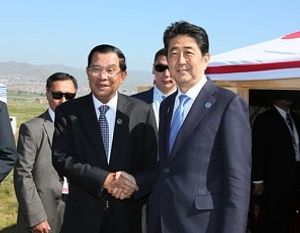Three Japanese warships are set to visit Cambodia next week, the Japanese embassy in Cambodia disclosed on Monday. Though both sides have been keen to label it a routine development, it is also a window into an expanding bilateral relationship as well as the balance Phnom Penh tries to strike among various major powers in its foreign relations.
According to an embassy press release, three vessels from the Japanese Maritime Self-Defense Force (JMSDF) are scheduled to visit Cambodia from February 13 to 16. The vessels – the Makinami, Asayuki, and Shimayuki – will be led by the commander of the Escort Division 3, Captain Masahiko Kawukubo.
The vessels will dock at the Sihanoukville Autonomous Port in southwestern Preah Sihanouk province. During the visit, Japanese personnel will visit Ream Naval Base, where they are expected to meet Cambodian military counterparts.
The press release also noted that Masahiko also plans to visit Phnom Penh to pay a courtesy call on Cambodia’s navy chief Admiral Tea Vinh on February 14. No further details were provided on the agenda for that meeting or for the trip more generally.
The Phnom Penh Post quoted Cambodia’s defense spokesman Chhum Socheat as saying that the arrival of the Japanese warships represents the sort of normal bilateral cooperation that Cambodia has already engaged in with other countries.
But it is also testament to the still modest but growing defense relationship Cambodia has cultivated with Japan in particular, as well as the increasing spotlight on the changing balance of Phnom Penh’s alignments among the major powers.
With respect to the growing Japan-Cambodia defense relationship, a key marker of this came when the two countries inked an agreement on defense cooperation and exchanges back in 2013 as part of a wider effort to broaden their relationship to a strategic partnership. That in turn has led to more interactions on the defense side, including Japanese ships making visits to Cambodia.
The warships visit will also be viewed from a broader geopolitical lens too as concerns persist about Cambodia’s growing dependence on China and the effect on Phnom Penh’s traditional ability to balance various major powers in its foreign relations, including in the defense realm (See: “China, Cambodia to Launch Major Military Exercise ‘Golden Dragon’”).
Last year for instance, much ink was spilled on a goodwill visit by three JMSDF vessels, mostly because they were followed by a joint naval training exercise between Cambodia and China. That was used by observers to highlight either Phnom Penh’s closeness to Beijing or its continued emphasis on balancing major powers.

































